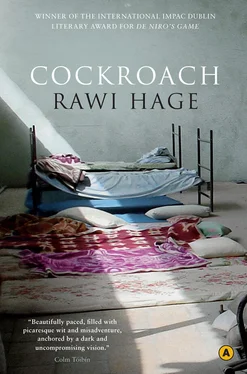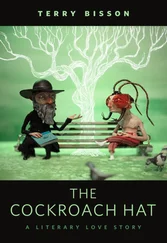Did you carry a gun?
Yes, later on I did. And I tell you, if I had a gun with me here, I wouldn’t have looked for a rope and a branch.
Why didn’t you get one?
I did not know where to get one in this land. And I did not have any money! I raised my voice.
The shrink was silent. I was silent. I looked her in the eye. She looked back at me. Neither of us moved.
She finally blinked and said: You might get a job. Then you could afford one.
I got up, opened the door, and left. The shrink did not follow me. She did not call me back. That woman is living in la-la land, I thought.
I went downstairs and waited at the entrance to the clinic, and as I waited I paced. I smoked and watched the newcomers to this land dragging their frozen selves into the elevator of this poor neighbourhood’s clinic, where they would wait in line, open their mouths, stretch out their tongues, inflate their lungs under the doctor’s stethoscope, breathe the names of uncles with tubercular chests, eject their legs like pompom girls, say “Ahh” with an accent, expose the whites of their droopy, malarial eyes, chase their running noses, wives, and imaginary chickens. . I checked my watch. It was around four-thirty. At five, a few employees started to leave the clinic. I imagined the white ghosts of their aprons hung by the neck on the back of their office doors. I positioned myself in a corner close to the elevator and waited for the therapist. For Genevieve.
When she passed, I did not recognize her at first. She had covered herself with a dark coat. But then I recognized her ankles and shoes, and I followed her. She walked from Côte-des-Neiges towards Outremont. I crawled behind her and six legs appeared from my sides like external ribs, and a newly thick carcass made me oblivious to the splashing water from passing cars. No element of nature could stop me now.
It was a long crawl. I noticed that Genevieve did not seem cold. Some creatures are oblivious to the heat and the cold wind, I thought as I crawled behind her toes. She did not stop to buy supper, or even bread and butter. She lived in a rich neighbourhood with shop windows displaying expensive clothing and restaurants that echoed with the sounds of expensive utensils, utensils that dug swiftly into livers and ribs and swept sensually above the surface of yellow butter the colour of a September moon, a cold field of hay, the tint of a temple’s stained glass, of brass lamps and altars, of beer jars, wet and full beneath wooden handles that gave me a thirst for an executioner’s hands, for basement doors and the downward swing of falling boats, sailor’s knots, and ropes stretched around gulping, gorging, foaming throats, sounding calls for the last meal, the last count, the last sip before the return of the sun.
I saw where Genevieve lived, and then I crawled home.
THE NEXT DAY, FRIDAY, I woke up early. I returned to Genevieve’s place and watched her leave her house for work. Then I slipped past the building’s garage door, went down to the basement, and crawled along the pipes. I sprang from her kitchen’s drain, fixed my hair, my clothes, my self, and walked straight to her bedroom. On the bedside table were a few prescription pills, some books and magazines. A painting of a naked lady in an intimate, yet unrevealing, position hung above the bed. She had a large bed, unmade. I crawled up onto it and sniffed her pillow and bathed in the scent of her sheets. I found a spot that was still warm. I measured it, speculating that the weight of her torso gave it that curved shape (I am fond of torsos, the arched ones that stretch like endless valleys between soft green hills). I curled up and rolled like a kid down the hills. I covered myself with a sheet, inhaled, and wept a little under clouds of cotton and the blue sky. Then I made Genevieve’s bed and lay on my back and looked around her room. I wanted to see what she saw before taking off her glasses, before she closed her eyes for the day. What if I were to stay here, in her bed? I thought. What if she comes home and sees a considerate stranger who makes the bed and saves the other side for her to slip her toes into as she asks me if I am asleep, if I had a good day, kissing my forehead, hoping that I will wake up, take her in my arms, listen to her story about the man who was caught with a rope on a tree looking for a solid branch, in the park, early on a cold day, on a sunny day, and how he confided that he had had the best cup of coffee that morning, and he insisted that he wanted to escape the sun, and why the sun, what is wrong with the sun, mon amour ? Can you tell me before you sleep? Can you ignore the desire to stroke my inner thighs, can you please listen to me after my long day in the office nodding to battered wives, impoverished immigrants, depressed teenagers; I need you to listen to me. .
The stranger stood up and walked to the kitchen, opened the fridge; it was filled with food — French cheeses, ham, and eggs. He made himself some toast, pasted on some ham and tomato slices, dropped a few thin sheets of cheese on top, decorated it all with lettuce, and moved to the living room with a large plate in his hand. As he ate, he examined souvenirs, figurines, pottery, travel books, and coffee-table books. He opened the pages of a large, heavy photography book. Then he picked up a book on Weegee, with its photographic work from the forties and fifties. He ate his ham sandwich and examined Americans dancing the cha-cha, poor people working, kids with hunched shoulders smiling under the fountains of fire hydrants, and then images of murders, people stabbed, shot in the face, men stretched out bleeding, a dead man lying under the shiny shoes of inspectors, and curious hats gathered to watch the dead, many men with round hats, spectators, some even smiling at the camera. He flipped the pages again and again, looking at well-dressed men lying shot, with open arms, as if still calmly breathing through their blood-covered faces. And the stranger laughed at one caption under a photograph that said: “Here he is left in the gutter.” “Dead on arrival,” another caption said. But the stranger was intrigued most of all by the one that said: “Their first murder.” The image showed a crowd of kids and adults, a close-up of their faces. The photographer must have been very close to the crowd, thought the stranger. Some of the kids were even laughing and playing and stretching their heads towards the lens, and in the background a woman, surrounded by the crowd of kids, was crying.
The stranger finished his sandwich, picked up every crumb and put it on the plate, and closed the book. He thought about murders, about how all nations are built in the image of a murder. Then he noticed a pair of slippers faithfully waiting in the middle of the dining room for Genevieve’s toes to come back, wiggle inside the slippers’ bellies, fuse into one another and slip over the wooden floor in the sequences and stops and waltzes of virgins and princes, to the accompaniment of string quartets (and trays carrying sandwiches of ham, tomatoes, a few thin sheets of cheese, decorated with lettuce) and large fancy chandeliers, and marvellous tables, marble and marvel, darling, and dancing white gowns turning towards bowing men, future officers, who shall bear arms and dance and dance like me. . After the cockroach danced, so the tale goes, he lay down on the floor. He closed his eyes and rested his cheek on the slippers and acted dead (without a hat), smiling, then inhaling the faint smell of Genevieve’s feet, aware of his own erection, satisfied with his full belly, feeling the soft carpet. With his many feet he caressed the floor beneath him and fell asleep.
When he woke up, he rose and picked up a portrait of Genevieve from when she was younger. She was hugging a handsome man with blond hair and good teeth, both of them smiling back at the intruder in the living room, not seeming to mind his presence, heads leaning in towards each other. In the background there was a blue beach glittering with pools of sunrays, which explained the need for the sunglasses that crowned the lovers’ foreheads. The intruder, feeling at home, turned on the TV, put up his feet on the table, and watched the confessions of single ladies, sleazy men, and a talk-show host discussing relationships, sex, and betrayals. A large lady in a jogging suit was pointing her finger at an ex-boyfriend, saying, “He slept with my girlfriend, my mother, and my sister.” And before the chairs started to fly on the stage, before the crowd cheered for blood, before there was hair-pulling and disorder, the stranger in the house decided to wear the slippers, go to the sink and clean the dishes, roll back the ham, cover the cheese, and put the lettuce back in the fridge. He opened the fridge again, drank some juice, then turned off the TV, left his tube of stolen lipstick, open and red, on the dining table, took the slippers, and left down the drain, hugging his loot, making sure that his prize did not get wet and was not touched by the mildew on the dripping walls.
Читать дальше












